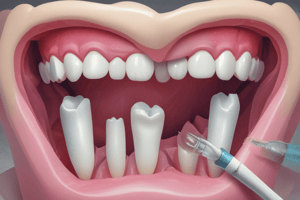Podcast
Questions and Answers
What are irritant poisons primarily responsible for causing?
What are irritant poisons primarily responsible for causing?
- Respiratory distress and fatigue
- Irritation, pain, and excessive vomiting (correct)
- Excessive sweating
- Nausea and dizziness
Which category does not belong to the classification of irritant poisons?
Which category does not belong to the classification of irritant poisons?
- Inorganic poisons
- Organic poisons
- Toxic minerals (correct)
- Mechanical poisons
Which of the following best describes inorganic poisons?
Which of the following best describes inorganic poisons?
- Metallic and non-metallic compounds that can be harmful (correct)
- Pollutants that are harmless to human health
- Natural substances with no chemical reactions
- Substances containing carbon that typically cause irritation
What would be an example of a mechanical poison?
What would be an example of a mechanical poison?
What is a common effect of organic irritant poisons?
What is a common effect of organic irritant poisons?
Flashcards
Irritant Poisons
Irritant Poisons
Substances that cause irritation, pain, and excessive vomiting.
Inorganic Irritants
Inorganic Irritants
Irritants derived from non-living sources, like metals or minerals.
Organic Irritants
Organic Irritants
Irritants derived from living sources, like plants or animals.
Mechanical Irritants
Mechanical Irritants
Signup and view all the flashcards
What are irritant poisons?
What are irritant poisons?
Signup and view all the flashcards
Study Notes
Irritant Poisons
- Irritant poisons cause irritation, pain, and excessive vomiting.
- They are categorized into:
- Inorganic poisons
- Organic poisons
- Mechanical poisons
Studying That Suits You
Use AI to generate personalized quizzes and flashcards to suit your learning preferences.



